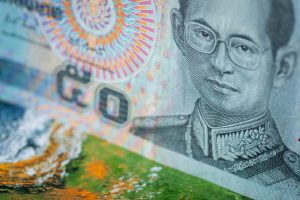Thailand will next month begin enrollment for its 450 billion baht ($12.5 billion) “digital wallet” stimulus program in a bid to revive the country’s ailing economy, the country’s finance minister announced yesterday.
Pichai Chunhavachai told reporters that eligible Thais will have from August 1 to September 15 to register for one-time handouts of 10,000 baht ($277), which are expected to be distributed in the fourth quarter of the year. Around 45 million people are expected to be eligible for the controversial “digital wallet” scheme, which Pichai said would “revitalize our entire economic system.”
“This is not just a normal cash handout,” Pichai said, the Bangkok Post reported. “It’s a stimulus that encompasses all levels of economic activity, which will lead to more income generation and generate additional tax revenue for the government to do other things.”
In order to take part in the “digital wallet” scheme, as it is known, recipients must be 16 years or older, have had an income below 840,000 baht ($23,296) in the 2023 tax year, and not be serving a prison sentence. The payments can then be spent at any shop that enrolls in the program. More than 2 million are expected to join, with the registration period beginning on October 1.
As the Bangkok Post explains, citizens have to buy products in shops located within their tambon (district), and money cannot be used to buy goods online. The payments cannot be used to buy “alcohol, tobacco, cannabis, lottery, gold, diamond, natural gas, fuel, electronic devices, and some other goods.”
The “digital wallet” stimulus plan is the centerpiece of Prime Minister Srettha Thavisin’s goal of firing up the Thai economy, which has grown at a sluggish pace since staggering out of the doldrums of the COVID-19 pandemic. Thailand’s economy grew by 2.6 percent in 2022, which S&P Global described as a “relatively modest pace of economic recovery from the recessionary conditions caused by the COVID-19 pandemic.” This then dipped to 1.9 percent last year, on the back of weak exports, particularly tourism.
In January, Srettha told reporters that the Thai economy “is not doing well and is in crisis.” This came shortly after the government revised its 2024 growth projections from 3.2 percent to 2.8 percent.
The plan was originally intended to commence earlier this year, but it was delayed by disagreements over how the government would pay for the stimulus – in particular, whether the traditionally fiscally conservative country would borrow money to fund it.
After much back and forth, the government has settled on a solution that will avoid taking on additional debt, spreading the costs out over the next two budgets: 165 billion baht from the budget for the 2024 fiscal year, which will end on September 30, and the remaining 285 billion baht from the 2025 fiscal year. (The plan was initially estimated to cost $500 billion, but officials have since said only 90 percent of the 50.7 million eligible citizens will enroll in the program, lowering the final price tag to about 450 billion baht.)
Whether the plan helps to stimulate growth and confidence in the Thai economy is contested. Opposition parliamentarians and economists, including former central bankers, have expressed concerns that the stimulus plan will sharply increase inflationary pressures in the Thai economy.
As James Guild wrote for The Diplomat in November, the stimulus plan “indicates the government wants to start breaking away from its heavy dependence on exports and rebalance economic activity more toward consumption.” But, he added, “not everyone agrees that a one-time cash giveaway is the best way to do that.”
All told, the stimulus is a considerable gamble for Srettha’s Pheu Thai party. When it made the controversial decision to form a government last year with its former foes in the military establishment, it did so on the expectation that it fire up the economy and could deliver concrete benefits for the Thai people. The stimulus payments will no doubt provide a short-term sugar hit to the economy in the last quarter of the year, but whether the benefits are more sustained could determine the fortunes of Srettha’s government – and the longer-term electoral trajectory of Pheu Thai.
































